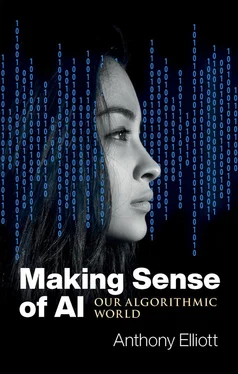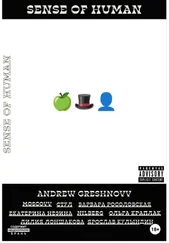There is more than a touch of foreboding or nostalgia in the sceptical insistence that AI is a cultural construct based on hype. For one thing, the sheer complexity of smart algorithms, deep learning, neural networks and intelligent machines represents a scandal to much orthodox economic thought, and especially the American dream of individualist self-creation. In certain circles responding to breakthroughs in AI, the very word ‘artificial’ evokes panic. To elevate artificial machine thinking as some kind of ideal for economy and society can only occur at the cost of downgrading human decision-making, or so it appears to many sceptics. Another factor is the wholesale attempt pervading the literature of sceptics to bring low today’s fashionable preoccupation with intelligent machines. From this angle, the idea that complex algorithms driving smart technologies provide proof of advanced machine intelligence – such as Apple’s Siri or Amazon’s Alexa, or even computational power underpinning self-driving vehicles – is far more questionable than much of the current debate recognizes. It is worth noting that sceptics rarely develop this criticism in any systematic fashion, and for the most part skirt altogether the broader issue of digitalization impacting economic and manufacturing transformations throughout the world today.
Other sceptics, writing about AI from a broader cultural or philosophical perspective rather than only about marketing or hype, have suggested that we live in an age of diminished intelligence. Our worries and anxieties, as Jaron Lanier notes in You Are Not a Gadget , reflect the spread of techno-futures which exclude the human. 1Technological culture, from social networks to complex algorithms, is viewed from this perspective as a complex of values and ideologies which imperil human intelligence and ways of life associated with humanism. The inflation of intelligence which is ‘artificial’ is thus part of the story of a post-humanist age, in which humanity threatens to disappear into the algorithmic bent of technology itself. At the core of this sceptical account there lies a conception of AI as absolute integration, the melding of man and machine. AI is taken to express the expanding scale of a technological culture which seeks to transcend the quotidian affairs of the human, the subjective or indeed the merely personal. AI manipulates reality for its own self-serving ends, and reality, in the brave new world of algorithmic culture, strips selfhood of any kind of interiority for its own self-interest.
It is not hard to detect in this doctrine the pervasive influence of pessimism. In one sense, this involves not only scepticism of recent claims about the coming golden age of AI, but profound doubt about the betterment of society through ‘technological progress’ more generally. From this angle, our technocentric view of the future – from self-driving cars to AI-powered megacities – shows a lamentable failure to engage with the virtues of human intelligence and the essential creativity of humanity. Arguably, nowhere is this more obvious than in the phenomenon of advanced automation, which some critics assert involves an unprecedented disregard of human skills and cognitive abilities. Nicholas Carr, a former editor of Harvard Business Review , is one of the most influential authors to argue that the risks arising from advancing automation have been radically underestimated. In The Glass Cage: Automation and Us , Carr contends that what is really sinister about automation is just how far it erodes autonomy. 2This is a theme he has pursued in his writings for some considerable period, dating back to a 2007 article he wrote in The Atlantic , ‘Is Google Making Us Stupid?’ He says that the automation of economy and society is double-edged: promising undreamt-of opportunities and new freedoms on the one hand, and yet impairing human expertise and deskilling women and men in profound ways on the other. It is just this contradiction that Carr detects in the widely discussed 2009 case of Air France Flight 447, which crashed into the Atlantic Ocean en route from Rio de Janeiro to Paris, killing everyone on board. Having entered a powerful storm, the aircraft’s autopilot system disconnected, after which the crew sought to regain control of the plane, but due to further complications were unable to do so. The catastrophic failure occurred, Carr contends, because the pilots had become overly reliant on automated systems, thus finding themselves unable to control the aircraft once flight computers had shut themselves off. It is just this radical deskilling effect which has elsewhere been referred to as the rise of ‘artificial stupidity’. 3
If one sceptical response to the rise of AI is to shrink the whole phenomenon to the category of myth, and another casts AI as a particular selection of technical values which diminishes human capacity, there is still another, third response which addresses more soberly the effects of AI on economy and society. From this standpoint, AI is neither dissociated from economy and society nor wholly interwoven with them. AI is rather a form of technological threshold which facilitates social opportunities and economic risks. Authors who write from this sceptical position believe that the impacts of AI are not dramatic and will take a considerable period of time, possibly many decades, to be fully realized at any rate. Should one pay any attention to claims of an AI revolution? Many sceptics say ‘no’. What, ask the sceptics, is ‘revolutionary’ about AI? Rejecting the equation of technology and transformation, this line of sceptical criticism develops a conception of workplace change which focuses squarely on the adaptability of employees, the enhancement of skills and new forms of economic efficiency and organizational innovation. 4Such a standpoint thus ties talent and technology firmly together. Such sceptics develop an argument for the continued primacy of workplace productivity, workers’ skills and emerging patterns of adaptation to technological innovation. From this standpoint, there is a clear disjuncture between the widespread innovations of AI and the world of work in which, for the most part, employees adjust to new technologies and find continued opportunities to acquire skills and capabilities.
This sceptical encounter is thus one which emphasizes people with technology – of a cultural response underscoring adaptation, adjustment and processes of reorganization. The idea that AI triggers a sudden lurch from one socio-economic system to another – say, industrial manufacture to new industries centred on digitalization – is rejected. To understand why this is so, a number of prominent economic historians contend that AI must be assessed against long-term patterns of historical change. 5From this broader standpoint, it is possible to better understand why AI is unlikely to mark a radical disjuncture in history. This is an argument for the ongoing centrality of established economic power and industrial production, with many sceptics discerning a mobile relation in the intersection of past and present across the forces of technological innovation. Modernization, and specifically the mechanization of agriculture, did not destroy economic and social exchanges in conditions of modernity, so why should the technological innovations of AI be any different? Only an historical approach to economy and society can be truly empathetic, capturing the long-term trends of political struggle in workplace change as well as the broad insight that technological innovation has, by and large, created more jobs than it has destroyed. This is not to deny the potential for social change, or economic dynamism. But if technological change and economic productivity are viewed as intersecting, so that the centrality of employment is emphasized, then innovations which were widely thought to be radical or transformational may in fact be more continuous or stable. In brief, technology-driven innovation in the era of AI is likely to produce more jobs and wages growth. 6Or, so argue the sceptics.
Читать дальше

![Джейн Остин - Sense and Sensibility [С англо-русским словарем]](/books/26612/dzhejn-ostin-sense-and-sensibility-s-anglo-thumb.webp)










